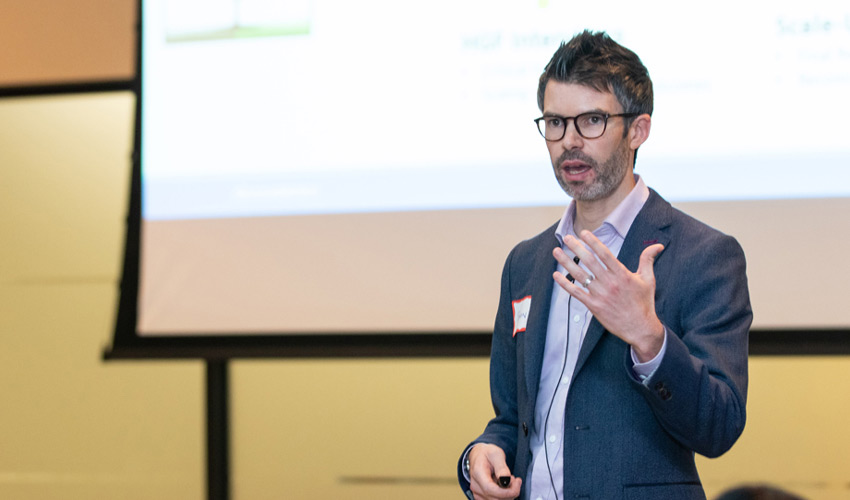Bissett professor supports Team Canada coaches in pursuing excellence from their athletes
Simon Raby, PhD, delivers innovation and change module of Canada Coach

Dr. Simon Raby, PhD, is part of a multidisciplinary team that works to strengthen the skill set of Team Canada coaches.
No matter the sport, coaches are always working to keep their athletes focused, working hard and progressing in their fitness and agility. Some of the best-trained coaches in the world are leading the Canadian athletes competing at the 2022 Winter Olympic Games
Dr. Simon Raby, PhD, an associate professor with the Department of Innovation and Entrepreneurship at Mount Royal University, is part of a multidisciplinary team that works to strengthen the skill set of Team Canada coaches through a Coaching Enhancement Program initiative called Canada Coach.
Program participants work to complete a quartet of four-day modules that take place in the spring and fall each year, and Raby has led the innovation and change module for the past four cohorts.
“The work Simon has done with our coaches led them to change their mindset towards change. Understanding how to take an innovative approach to critically assess a challenge, and dig into one’s network to seek solutions, results in tangible results on the field of play for their athletes,” says Laura Watson, high-performance coaching advisor at Own the Podium.
“Leading people who perform at a world-class level requires world-class talent, and Simon brings that to his work with our program.”
Raby says he has had the pleasure of working with more than 40 Team Canada coaches and is amazed at how humble each is.
“Everything a successful coach does is in service of their athletes. At the heart of a productive coaching relationship is trust, and trust helps build a strong, open working relationship,” explains Raby. “Successful coaches take a holistic approach to coaching that moves beyond the mere technical and physical components of performance to the cognitive and psychological health of the athlete. Coaches are ultimately leaders, they are accountable for the athlete's program (and ultimately performance), and must challenge, inspire and effectively support their athletes.”
Raby uses strategies that promote growth, leadership and performance to foster success in Team Canada coaches. For example, one competency focused on innovation is understanding the value of a social network. Raby says accessing one's network can play an important role in helping people problem solve.
“Often a coach would ask ‘why would someone want to speak to me?’ They often do not realize how exciting it is for those in their network to work with and contribute to Canadian Olympic and Paralympic athletes.”
Clare Fewster, mental performance consultant with Cougars Athletics, knows what it takes to work with high-level athletes and what coaches do to get their athletes in the mindset to win.
“While winning is an athlete’s goal, it is the coaches’ job to maintain the athlete’s focus,” she says.
“We can’t control the outcome, but we can control moments, so trying to be their best in each moment, reflect and thrive on getting better the next moment can be a great mindset.”
Raby explains that innovation is not only for corporations. “The principles and practices of innovation can be applied into individual, team and organizational contexts where the aim is to achieve higher levels of performance.”
He notes that the Coaching Enhancement Program will be renamed to Pursuit in the lead up to Paris 2024. Its vision statement is: To support and enhance Canada’s high-performance coaches and technical leaders through their inspired pursuit of excellence in Olympic and Paralympic sport.
Check out MRU’s Olympic coverage. Read What Olympic athletes can teach us about physical literacy and striving for excellence and An insider's look at a journey to the Olympics.
Feb. 10, 2022 — Rob Petrollini
Media request contact information.
Have a story idea? Please fill out this form.
